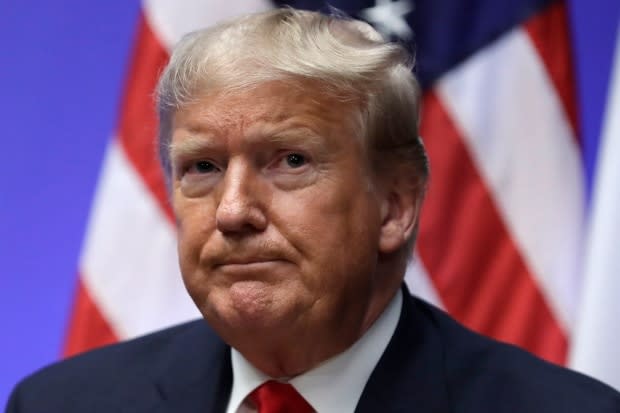Just the basics: A quick look at today's impeachment news
U.S. House Democrats announced two articles of impeachment Tuesday against President Donald Trump, charging him with abuse of power and obstruction of Congress.
The charges stem from Trump's pressure on Ukraine to announce investigations of his political rival as he withheld aid to the country as well as a sought-after White House meeting.
Article 1: Abuse of power
In the impeachment context, abuse of power is generally defined as using the vast powers of the presidency for personal benefit.
Abuse of power is not specifically listed as an impeachable offence in the U.S. Constitution, which states that a president can be removed from office for "treason, bribery, or other high crimes and misdemeanors."
But the founders of the United States intended the phrase "other high crimes and misdemeanors" to broadly encompass abuses of power, legal scholars said.
Article 2: Obstruction of Congress
Democrats levelled the obstruction charge based on Trump's stonewalling of the House's impeachment inquiry.
The White House has refused to provide documents to congressional investigators and has instructed top advisers and government officials to defy subpoenas and refuse to testify.
Contempt of Congress is a misdemeanor crime under U.S. law, which defines the offence as wilfully failing to provide testimony or documents to Congress.
The White House has argued that the Constitution does not require senior presidential advisers to appear for compelled testimony before Congress. A judge rejected that argument on Nov. 25 in a dispute over a subpoena issued to former White House counsel Don McGahn.
What's next
Democrats said they will recommend to the entire House of Representatives later in the week that the president be impeached, after a judiciary committee vote that is expected to fall along partisan lines.

Notable quotes
"Our president holds the ultimate public trust."
"When he betrays that trust and puts himself before country, he endangers the Constitution, he endangers our democracy, and he endangers our national security."
— Rep. Jerrold Nadler, Democratic chair of the House judiciary committee
"WITCH HUNT!"
"To Impeach a President who has proven through results, including producing perhaps the strongest economy in our country's history, to have one of the most successful presidencies ever, and most importantly, who has done NOTHING wrong, is sheer Political Madness!"
— President Donald Trump
"The argument 'Why don't you just wait' amounts to this: 'Why don't you just let him cheat in one more election? Why not let him cheat just one more time?'"
"To do nothing would make ourselves complicit" in Trump's actions.
— Rep. Adam Schiff, chair, House intelligence committee
"Dems unveiled their baseless, partisan articles of impeachment. They have no case for impeachment. No bribery. No quid pro quo. No abuse of power. The facts aren't on their side. This is a pathetic political mission to try to rig 2020 against @realDonaldTrump."
— Rep. Steve Scalise, Republican minority whip
How we got here
Democrats say Trump abused his power in a July 25 phone call when he asked Ukraine's President Volodymyr Zelensky for a favour in investigating Democratic presidential candidate Joe Biden, with his personal lawyer Rudy Giuliani leading a group of officials and others in pressuring Ukraine to do so in the weeks before and after. Nearly $400 million US in military aid Ukraine depended on to counter Russian aggression, and which Congress approved, was not sent to the allies for several weeks. It was released in September, after the Ukraine inquiry in Congress was already underway.

Republicans in the House have defended Trump during weeks of impeachment hearings, saying as a president he has the right to be concerned about the corruption issue in Ukraine. Democrats have claimed Trump's interest in corruption was superficial and not coincidental, given Biden's status as a front-runner for the 2020 presidential nomination.
What to watch for
The House judiciary committee is expected to debate and vote on the two articles of impeachment by the end of the week, considering each one separately.
Once the judiciary panel approves them, the articles are sent to the full House floor, where they could immediately be brought up for a vote. Democrats who hold the majority in the House, are expected to approve the articles by the end of next week, sending them to the Senate for a trial.
The Senate is expected to hold a weeks-long impeachment trial, likely in the first weeks of 2020. The senators would act as jurors, and select House members would act as prosecutors, or impeachment managers. The chief justice of the Supreme Court, John Roberts, will preside. If the Senate approves an article of impeachment with a two-thirds vote of "guilty," the president is convicted and removed from office. If all the articles are rejected, the president is acquitted.
A little history
This is the fourth time in history Congress has moved to impeach a president. If he were convicted by the Senate, Trump would be the first to be removed. But that is unlikely in the Republican-controlled Senate.
Bill Clinton was the last president impeached by the House, in 1998. As with President Andrew Johnson in the 19th century, Clinton was acquitted in the Senate. Richard Nixon resigned from office in 1974 after articles of impeachment were approved but before a Senate trial could take place.


